Weizhao Jin
EmbodiedBrain: Expanding Performance Boundaries of Task Planning for Embodied Intelligence
Oct 23, 2025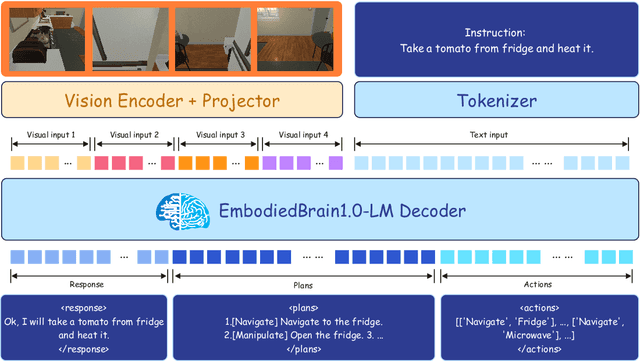


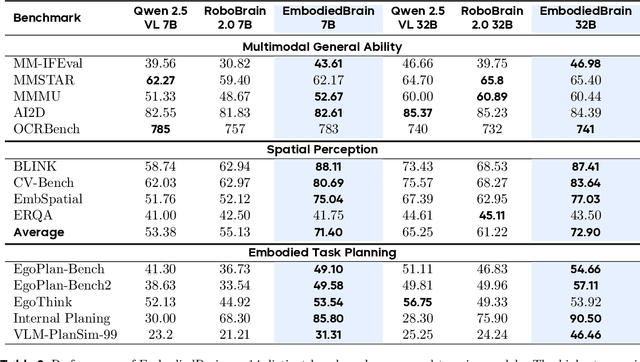
Abstract:The realization of Artificial General Intelligence (AGI) necessitates Embodied AI agents capable of robust spatial perception, effective task planning, and adaptive execution in physical environments. However, current large language models (LLMs) and multimodal LLMs (MLLMs) for embodied tasks suffer from key limitations, including a significant gap between model design and agent requirements, an unavoidable trade-off between real-time latency and performance, and the use of unauthentic, offline evaluation metrics. To address these challenges, we propose EmbodiedBrain, a novel vision-language foundation model available in both 7B and 32B parameter sizes. Our framework features an agent-aligned data structure and employs a powerful training methodology that integrates large-scale Supervised Fine-Tuning (SFT) with Step-Augumented Group Relative Policy Optimization (Step-GRPO), which boosts long-horizon task success by integrating preceding steps as Guided Precursors. Furthermore, we incorporate a comprehensive reward system, including a Generative Reward Model (GRM) accelerated at the infrastructure level, to improve training efficiency. For enable thorough validation, we establish a three-part evaluation system encompassing General, Planning, and End-to-End Simulation Benchmarks, highlighted by the proposal and open-sourcing of a novel, challenging simulation environment. Experimental results demonstrate that EmbodiedBrain achieves superior performance across all metrics, establishing a new state-of-the-art for embodied foundation models. Towards paving the way for the next generation of generalist embodied agents, we open-source all of our data, model weight, and evaluating methods, which are available at https://zterobot.github.io/EmbodiedBrain.github.io.
FedGraph: A Research Library and Benchmark for Federated Graph Learning
Oct 08, 2024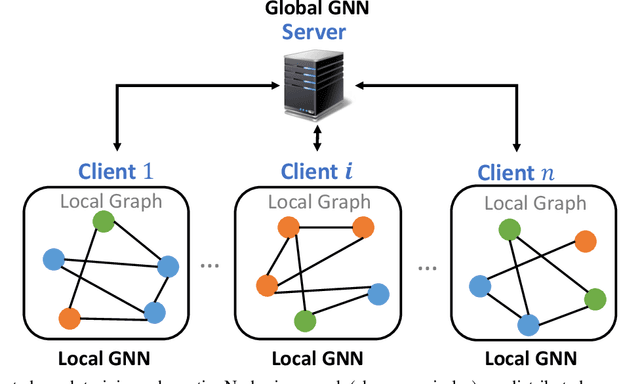
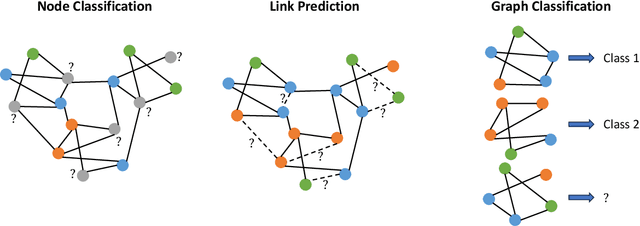
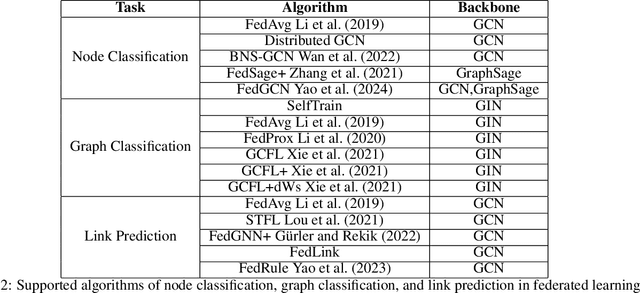
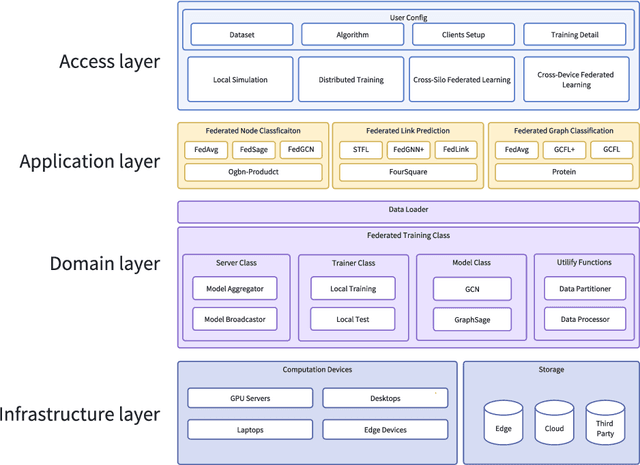
Abstract:Federated graph learning is an emerging field with significant practical challenges. While many algorithms have been proposed to enhance model accuracy, their system performance, crucial for real-world deployment, is often overlooked. To address this gap, we present FedGraph, a research library designed for practical distributed deployment and benchmarking in federated graph learning. FedGraph supports a range of state-of-the-art methods and includes profiling tools for system performance evaluation, focusing on communication and computation costs during training. FedGraph can then facilitate the development of practical applications and guide the design of future algorithms.
LLM Multi-Agent Systems: Challenges and Open Problems
Feb 05, 2024
Abstract:This paper explores existing works of multi-agent systems and identifies challenges that remain inadequately addressed. By leveraging the diverse capabilities and roles of individual agents within a multi-agent system, these systems can tackle complex tasks through collaboration. We discuss optimizing task allocation, fostering robust reasoning through iterative debates, managing complex and layered context information, and enhancing memory management to support the intricate interactions within multi-agent systems. We also explore the potential application of multi-agent systems in blockchain systems to shed light on their future development and application in real-world distributed systems.
Kick Bad Guys Out! Zero-Knowledge-Proof-Based Anomaly Detection in Federated Learning
Oct 06, 2023



Abstract:Federated learning (FL) systems are vulnerable to malicious clients that submit poisoned local models to achieve their adversarial goals, such as preventing the convergence of the global model or inducing the global model to misclassify some data. Many existing defense mechanisms are impractical in real-world FL systems, as they require prior knowledge of the number of malicious clients or rely on re-weighting or modifying submissions. This is because adversaries typically do not announce their intentions before attacking, and re-weighting might change aggregation results even in the absence of attacks. To address these challenges in real FL systems, this paper introduces a cutting-edge anomaly detection approach with the following features: i) Detecting the occurrence of attacks and performing defense operations only when attacks happen; ii) Upon the occurrence of an attack, further detecting the malicious client models and eliminating them without harming the benign ones; iii) Ensuring honest execution of defense mechanisms at the server by leveraging a zero-knowledge proof mechanism. We validate the superior performance of the proposed approach with extensive experiments.
Labeling without Seeing? Blind Annotation for Privacy-Preserving Entity Resolution
Aug 07, 2023



Abstract:The entity resolution problem requires finding pairs across datasets that belong to different owners but refer to the same entity in the real world. To train and evaluate solutions (either rule-based or machine-learning-based) to the entity resolution problem, generating a ground truth dataset with entity pairs or clusters is needed. However, such a data annotation process involves humans as domain oracles to review the plaintext data for all candidate record pairs from different parties, which inevitably infringes the privacy of data owners, especially in privacy-sensitive cases like medical records. To the best of our knowledge, there is no prior work on privacy-preserving ground truth dataset generation, especially in the domain of entity resolution. We propose a novel blind annotation protocol based on homomorphic encryption that allows domain oracles to collaboratively label ground truths without sharing data in plaintext with other parties. In addition, we design a domain-specific easy-to-use language that hides the sophisticated underlying homomorphic encryption layer. Rigorous proof of the privacy guarantee is provided and our empirical experiments via an annotation simulator indicate the feasibility of our privacy-preserving protocol (f-measure on average achieves more than 90\% compared with the real ground truths).
FedMLSecurity: A Benchmark for Attacks and Defenses in Federated Learning and LLMs
Jun 08, 2023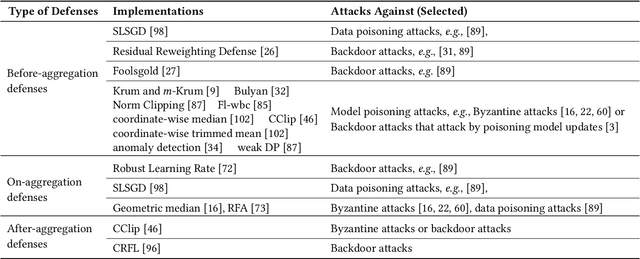

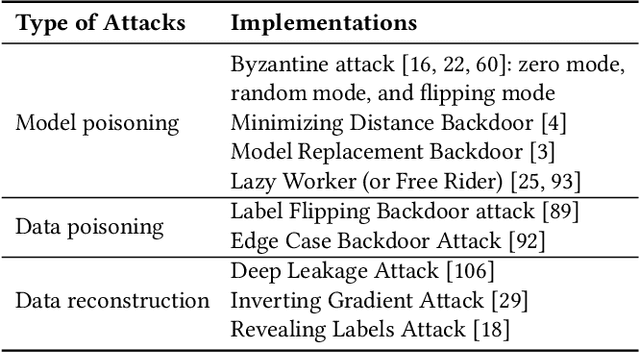

Abstract:This paper introduces FedMLSecurity, a benchmark that simulates adversarial attacks and corresponding defense mechanisms in Federated Learning (FL). As an integral module of the open-sourced library FedML that facilitates FL algorithm development and performance comparison, FedMLSecurity enhances the security assessment capacity of FedML. FedMLSecurity comprises two principal components: FedMLAttacker, which simulates attacks injected into FL training, and FedMLDefender, which emulates defensive strategies designed to mitigate the impacts of the attacks. FedMLSecurity is open-sourced 1 and is customizable to a wide range of machine learning models (e.g., Logistic Regression, ResNet, GAN, etc.) and federated optimizers (e.g., FedAVG, FedOPT, FedNOVA, etc.). Experimental evaluations in this paper also demonstrate the ease of application of FedMLSecurity to Large Language Models (LLMs), further reinforcing its versatility and practical utility in various scenarios.
FedML-HE: An Efficient Homomorphic-Encryption-Based Privacy-Preserving Federated Learning System
Mar 20, 2023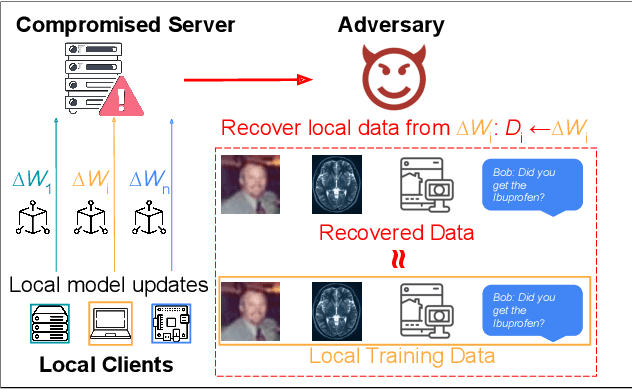


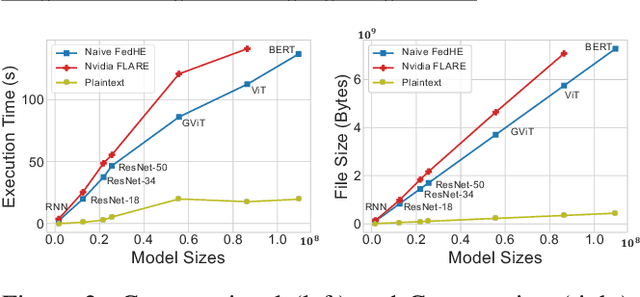
Abstract:Federated Learning (FL) enables machine learning model training on distributed edge devices by aggregating local model updates rather than local data. However, privacy concerns arise as the FL server's access to local model updates can potentially reveal sensitive personal information by performing attacks like gradient inversion recovery. To address these concerns, privacy-preserving methods, such as Homomorphic Encryption (HE)-based approaches, have been proposed. Despite HE's post-quantum security advantages, its applications suffer from impractical overheads. In this paper, we present FedML-HE, the first practical system for efficient HE-based secure federated aggregation that provides a user/device-friendly deployment platform. FL-HE utilizes a novel universal overhead optimization scheme, significantly reducing both computation and communication overheads during deployment while providing customizable privacy guarantees. Our optimized system demonstrates considerable overhead reduction, particularly for large models (e.g., ~10x reduction for HE-federated training of ResNet-50 and ~40x reduction for BERT), demonstrating the potential for scalable HE-based FL deployment.
 Add to Chrome
Add to Chrome Add to Firefox
Add to Firefox Add to Edge
Add to Edge